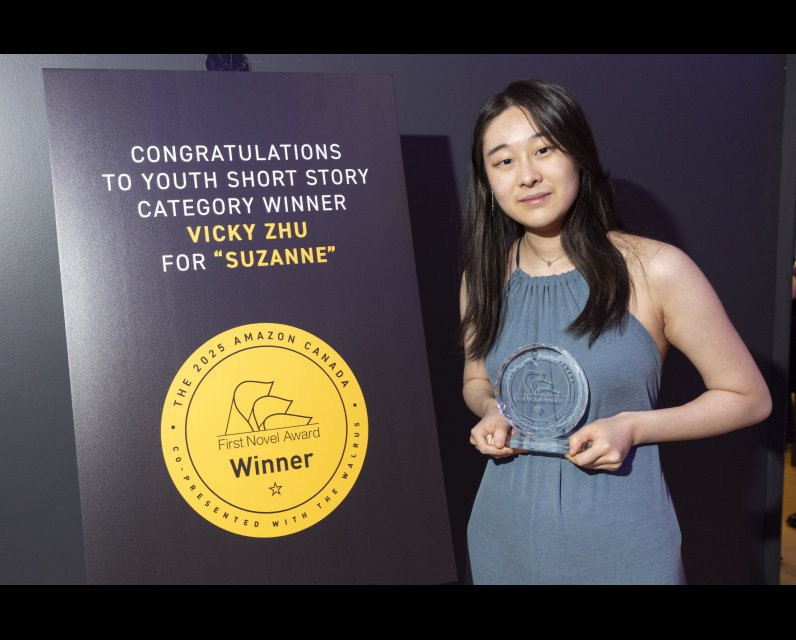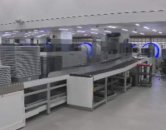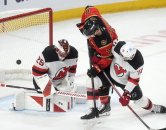Stay informed
“Suzanne”

document.getElementsByClassName('th-hero-container')[0].insertAdjacentHTML('beforebegin', ` IN PARTNERSHIP WITH AMAZON CANADA `); document.getElementsByClassName("cat-links")[0].innerHTML = 'In Partnership with Amazon Canada';
.gallery {/*margin-bottom: 0; top: -40px; position: relative;*/} div.gallery span.hm-tagged {/* margin: 0; */}Vicky Zhu is a writer from BC, Canada. She is an alumna of the Iowa Young Writers Studio, and her work has been recognized by Scholastic Arts and Writing Awards, the New York Times, and the John Locke Institute. When she is not overediting her work, you can find her hunting for indie albums, debating, or designing her next robotic contraption.
The prize for her winning short story was $5,000 and her story will be published in the January/February 2026 print edition of The Walrus magazine.
The albatross left the day our AC broke down. Suzanne brought a portable fan to the living room, and we watched the white blades julienne the coagulated heat. The plastic whirred, tracing circles and going nowhere.
To cleave the silence, I spoke about the fledgling on the roof, now lapping up the sky with every wing stroke. How it left at dusk, its half-formed wings beating against the half-decayed horizon; the roof, now lacking its presence. It’s still here, Suzanne says, you can still hear its song.
They do not need sound to be singing.
—
Suzanne lives in a white house, so plastered and pale that the wayward sand practically scars the surface. This is not surprising; the house does not stand so much as it crawls toward the ocean. Even the realtor printed “eroding foundation” in small text. I know that because I was the realtor. When Suzanne moved last spring, I did not know better than to ask why this house, in particular. The house, too, needed company, she answered, after staring at me long and hard.
She is a painter by profession, but Suzanne says she means it more as a metaphor; she does not paint so much as catalogue slips of memory. Personally, I always questioned how much can be held in a wild dash of colour. But I try to believe. I watch her in slow dawns, capsules of paint scattered like wishbones around her easel and try to see it in every pigeon wing and tugboat kissing the gessoed linen; her fingers forming swollen crescents around the brush; the quiet tell-tale transfer.
—
As we get closer, Suzanne tells me only she remembers her story the right way. When I ask her what it is, she never gives an answer. Sometimes, when pressed, she speaks of sweetgrass and fistfuls of June bugs; wheat laced by sun rays; the last grains evading harvest. Suzanne says she is from the Midwest, but when asked where, she pauses, her lips agape.
Saskatoon, she starts, then starts over. Saskatoon. She pauses, then repeats. She dips her hand back into the paint box and begins again.
This is the way weekends work: Suzanne in creation; I, tracking the dips and spikes of a wayward housing market. Sometimes, we talk, carving out slivers of our respective lives. She is a keen listener, doling out half-glances and an occasional bright sting of laughter. She claims she has never gone to art school; I silently question the truth of that statement. I track the arch of her wrist as she strokes the canvas in flaxen yellow: there, a full, rotund moon, then, a morning albatross. She says she thinks of seabirds now because one had just filled a rafter with a cluster of eggs. I marinate on the streak of white on the edge of her collarbone—dulled, as if seeped through skin. I watch her reach for the tube.
Suzanne, why lead white? Out of all paints. It’s the purest they sell. It’s toxic. I know.
A bristled tip scratches the canvas. She bites her lip; lets the brush drop onto the paint box. I watch her rise and walk out—I take this as my cue to leave as well. The hallways are littered with canvas; propped up, hung, stacked. Half-formed faces with averted eyes; the barren crook of twigs; midnight rain; a road half-travelled. Her voice, lighter than breath, somewhere forward.
Maybe don’t follow me.
—
By night, Suzanne moves in by the slit of my front door that I keep propped ajar. Some dim part of me knows I want her to stay every time, to hear her voice. This was my fault—I clung onto forsaken words, threaded to expired conversations. But I can’t help it, I like to see her the clearest in sleep; the way her shoulder carves against the couch, breaths rising like pulses. She is curled in a fetal position, as if trying to grow the emptiness around her.
How can someone who holds so much inside look so blank to the world? Where does she go when she’s not here and awake? I’ve seen her cross this threshold of there, and then not; I hear it in clouded sentences and the drawl of her vowels. And the words that come quickly against teeth.
We owned a wheat plantation. Saskatoon. My father. Backhand.
I want to tell her I understand, that I can give her the softness and warmth she deserves. I want it not to be a lie. I let her hold my hand as tightly as she wants for as long as she wants. Still now, I can see the small rows of sunken crescents where her nails once were; the heaviness of her palm still cleaving into mine.
—
The last thing I want to learn is that oil paintings burn with only a finger’s worth of heat. I know this when Suzanne pulls out a matchbox and slashes a match into a blaze; I look away because I can already see the smoke unravelling from the pyre of canvases. I am on your porch, far enough to be cupped against the heat, but I see it all so fast: frames, crumbling into each other, then into the sand.
Suzanne shrinks into the step beside me. We watch the late tide sift through the remains, seafoam sinking under the leaked colour. The mound is so dark, so thick, it looks like a wounded animal more than a destroyed craft.
Suzanne. Hm? Why do all this if it’s not going to last? Give me a reason to stay. Here. Alive.
She laughs—a sharpness that lingers for a beat too long. We sit—Suzanne and I—as if stillness reminds us that we are still here. I try to swallow this choking feeling crawling up in small, hot waves. I cannot look at her. Instead, I look at the last of the wooden frames, gnarled and blackened beyond recognition. The smoke rises, thick with exile.
—
Suzanne, why do you use lead white? Her breath is thick and drunk with sleep. Her voice: droplets. Everything else has an undertone. I want honesty.
—
Sometimes, at the trace of midnight, I wonder when this will end. When she will stare at the rising tides and slip away for another place at a different dawn.
You can stay here, seabird, I tell her, there will always be room for you, but her eyes are already glazed with the blur of distant shorelines. I tell myself I know this. I know her: her dark clutch of breath, her half-formed sentences, so raw and bygone they are almost past tense. I hold her as she sleeps like a fistful of water; watch as my skin crests her and leaves dim splotches. I know I am drowning into her. I want to stay like a lifebuoy that no longer knows its line. I think of her: heavy limbs and crumbled thoughts, poised in uncertain flight, heading everywhere but remaining homeless all at once.
—
I know she has left when I wake up to a couch that feels obtrusively wide. I see her there, outside, her shoulder blades bare. Her bird shoulders, thin and sharp enough to punctuate the sky. The morning fog has already slunk away, stilling against the window panes. As if a dream, I see the ocean, gray and ruffled, nipping at the remaining stain. I head out with a quilt.
Within twenty steps, she sees me. Paintbrush poised. Wide, marble eyes. Closer now, I see her fingers sunken in sharp, bone-white. They are trembling, soft and fast.
Suzanne, it’s so cold out here. She says nothing. The quilt drips off her shoulders.
Suzanne, can you please stop? Her fingers: so white and heatless. Her smeared fingerprints on my arm when she pries her hand away.
Somewhere, an albatross caws; a guttural sound muted in foreign waters. I can see every flake of skin, torn and raised on her lip, weeping deep, deep red. She turns away.
Suzanne, I say. This white will kill you. ོ
The post “Suzanne” first appeared on The Walrus.


Comments
Be the first to comment